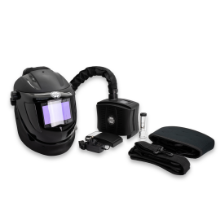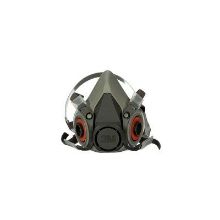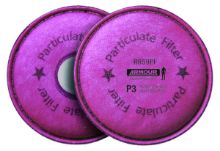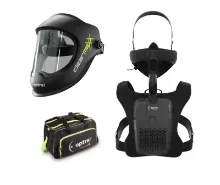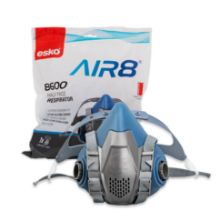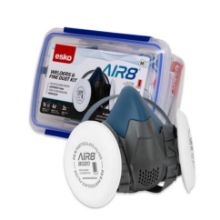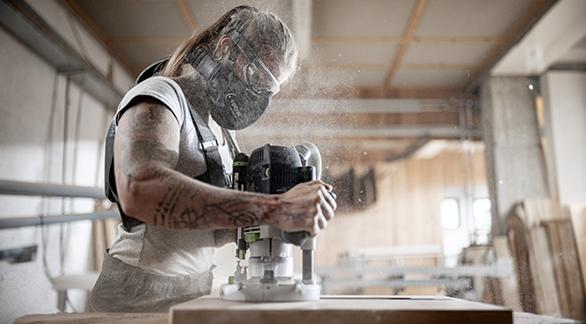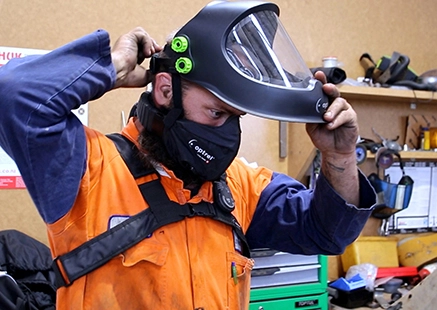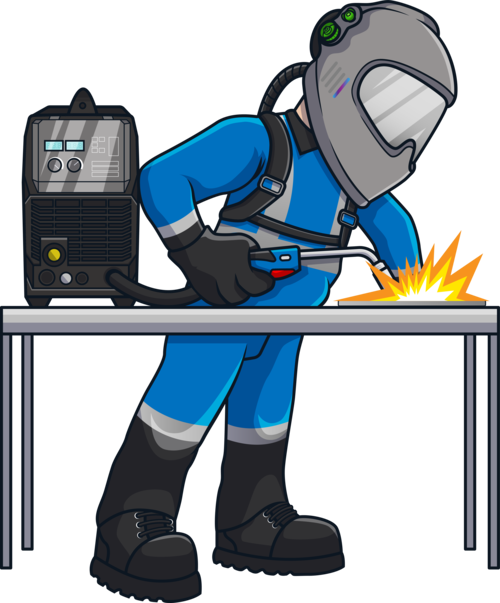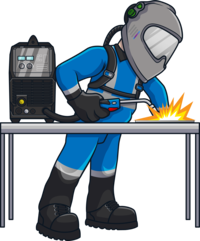Table of Contents
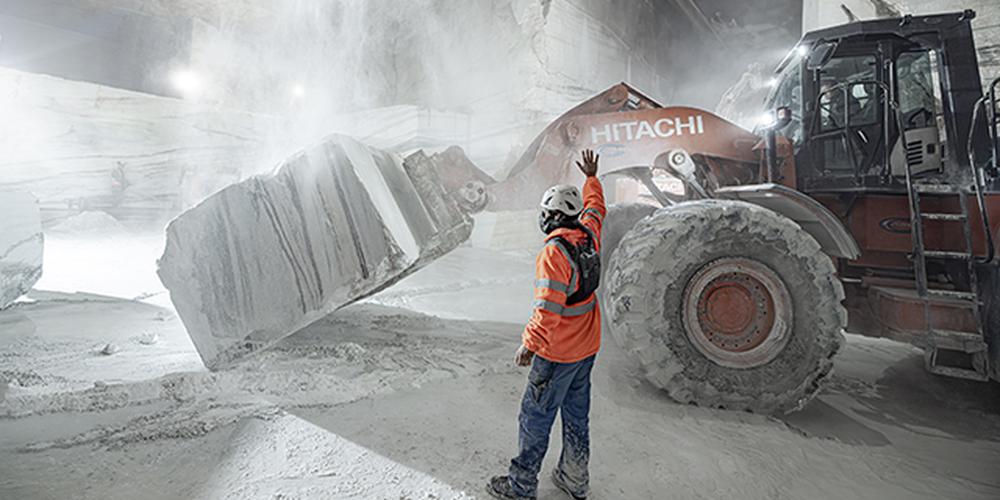
In workplaces across New Zealand, controlling exposure to dust, fumes, and airborne contaminants is key to protecting health and meeting compliance standards. Whether welding, sanding, grinding, painting, or cutting concrete, choosing the right type of dust mask or respirator can make a critical difference in safety and comfort.
This article outlines five common types of dust masks and respirators, their intended uses, strengths, and limitations. Understanding the features of each will help workshop supervisors and engineers select the right option for the job.
Fabric Masks
Cloth and surgical masks became widespread in public spaces during the pandemic. While helpful in slowing the spread of viruses, these masks are not classed as respiratory protective equipment (RPE). They are unsuitable for dusty or fume-heavy industrial settings and do not meet recognised safety standards like AS/NZS 1716 or EN 149.
On the other hand, certified respirators are specifically designed to protect the wearer from airborne hazards. These must meet rigorous standards, including New Zealand P1, P2, or P3 classifications. The key difference lies in filtration efficiency and the ability to form a proper seal around the face.
Face coverings are functional in low-risk public scenarios. However, a certified respirator is essential in a workshop or construction environment. A basic cloth mask offers no reliable protection for anyone working with wood dust, concrete dust, metal fumes or chemical vapours.
Disposable Respirator Masks (P1, P2, P3 Class)
Disposable respirators are lightweight and convenient for short-term use. Their performance depends on achieving a tight seal around the wearer's face, which is why a proper fit test is essential. These masks are classified according to their filtration level:
- P1 – Basic protection against non-toxic dusts. Ideal for sweeping, sanding untreated timber, or similar tasks involving low-risk particulates.
- P2 – Medium-level protection against fine dusts, smoke, and airborne biological particles such as mould spores or bacteria. Suitable for general building work, fibreglass handling, and non-toxic welding fumes.
- P3 – High-level filtration for fine particles, including crystalline silica, asbestos, or lead dust. Often required for demolition, stone cutting, or work involving hazardous materials.
Proper fit is vital for effectiveness, and respirators should be replaced if damaged, damp, or difficult to breathe through.
For instance, the Esko Breathe Easy P2 Carbon Filter Valved Mask 12Pk provides P2-rated protection and a carbon layer to reduce exposure to low-level organic vapours. This mask has an AIR8™ exhalation valve for improved comfort and dual straps for a secure fit, making it suitable for regular use in construction, welding fume exposure, or light manufacturing.
Disposable masks like these are beneficial for mobile workers or tasks of short duration. However, they are designed for one-time use and must be discarded after removal. While they offer convenience, using them daily can become costly, and they contribute to environmental waste.
Reusable Half Masks with Non-Replaceable Filters
Reusable masks with fixed filters offer a middle ground between disposables and complete reusable systems. The filter element is integrated into the mask and cannot be changed. Once the filter is used up, the whole unit must be replaced.
These are often rated with combination filters, such as A2/P3, which protect against particulates and organic vapours. They're commonly used in woodworking, construction, painting, and finishing. These masks are particularly valued in joinery, cabinet making, and renovation tasks where dust and solvent fumes are present.
The mask body is typically made from soft elastomeric materials that mould to the face and help form a tight seal. This design supports a consistent, repeatable fit each time it's worn. Fit testing is required, and although the filters are not replaceable, these masks may be used for up to 28 days, depending on the exposure level. Users should dispose of them earlier if breathing becomes difficult or contaminants can be tasted or smelled. They often come with resealable bags for safe storage between uses.
Reusable half masks with non-replaceable filters are more economical over time than disposable masks, especially for users who need daily protection. They also produce less plastic waste and are easier to fit correctly due to their more robust design.
Reusable Half Masks with Replaceable Filters
Reusable half-mask respirators with replaceable filters provide flexibility, extended service life, and cost efficiency. With proper maintenance, these masks can be used for months or even years. The filters, which come in a wide range of types, are changed based on exposure type and duration.
Standard filter options include:
- P2 or P3 particulate filters – For harmful dust, smoke, and fumes.
- A1, A2, or B-type gas and vapour filters – For protection against organic solvents, ammonia, or acid gases.
- Combination filters are used for mixed hazards and are often found in painting, agriculture, and heavy manufacturing.
Pre-filters can protect the main filters from early clogging. This is especially useful in dusty environments such as concrete drilling or stone cutting. A basic maintenance program ensures reliability and involves checking the facepiece, valves, and seals regularly and cleaning after each use.
These masks require users to maintain care logs and follow manufacturer guidelines for hygiene. While heavier and bulkier than disposables, they are an excellent option for workshops where the same staff use respiratory protection daily.
Fit testing is essential, and workers must be clean-shaven around the sealing area for the mask to function effectively. Overall, these masks provide a low lifetime cost per use and considerably reduce environmental waste.
Powered Air-Purifying Respirators (PAPR)
Powered Air-Purifying Respirators, or PAPRs, are advanced systems that use a battery-powered blower to draw air through filters and deliver it to the user's headpiece. These units offer superior protection, particularly in high-dust or fume-heavy environments requiring long wear times.
PAPRs are rated under standards such as EN 12941 and come in TH1, TH2, or TH3 filtration levels, with TH3 offering the highest protection. The positive pressure in the headpiece prevents contaminated air from leaking and ensures consistent airflow to the user.
One significant benefit of PAPRs is that they do not rely on a tight facial seal. This makes them suitable for workers with beards or those wearing glasses. They also help reduce fogging and discomfort by delivering cool, filtered air to the face.
Popular PAPR Systems Offered by Proline Industrial
1. Strata DW7000XL PAPR Auto Darkening Welding Helmet
This helmet combines respiratory protection with a high-quality welding helmet. It includes a PRSL battery-powered air filtration unit, True-Colour auto-darkening lens (shade 5–13), and a flip-up visor for grinding. It offers a full head, neck, and face protection system for harsh welding environments.
The DW7000XL stands out as a comprehensive solution for welders who need both visual clarity and respiratory safety. Its True-Colour lens technology significantly enhances visibility by offering a realistic colour view, reducing eye strain and improving accuracy during precision work. With a variable shade of 5–13, the helmet is suitable for all major welding processes, including MIG, TIG, ARC, plasma cutting, and grinding, making it a versatile option across varied applications.
For respiratory protection, the helmet includes a battery-powered PRSL air-fed filtration unit, delivering a constant supply of clean, filtered air to the user. This is particularly important when working in environments with harmful welding fumes or when welding galvanised or coated materials, which can release hazardous particles. The unit is lightweight and designed for all-day wear, supporting both safety and comfort.
Additional safety features include side vision panels with DIN 5-rated polycarbonate material, offering 160° peripheral visibility so users can stay aware of their surroundings without compromising protection. The full-size grinding visor, accessed by flipping up the welding front, provides a crystal-clear view for grinding tasks, removing the need to switch to a different face shield.
Whether you're on-site in a heavy industrial environment or working in a workshop setting, the Strata DW7000XL offers everything needed to maintain safe breathing, clear vision, and reliable coverage in one integrated, user-friendly system.
Watch the full Strata DW7000XL overview video HERE
2. Optrel Swiss Air PAPR with Clearmaxx Grinding Helmet Kit
A cutting-edge solution with a TH3-rated filtration unit and flame-retardant ventilated half-mask, the Swiss Air system delivers purified air through a shoulder-mounted blower and advanced control panel. Compatible with any welding helmet and paired with a Clearmaxx grinding visor, it’s ideal for multi-trade use. Positive pressure supports relaxed, fatigue-free breathing, while its ergonomic, lightweight design ensures long-term comfort, perfect for all-day use in demanding environments.
What sets the Optrel Swiss Air apart is its revolutionary ventilated half-mask design, which fully covers the mouth and nose area, creating a clean, pressurised breathing space. Thanks to positive air pressure, users experience no breathing resistance, a game-changer for those used to traditional masks that can feel restrictive or exhausting during long shifts. The result is enhanced endurance and less physical fatigue, especially important in high-particulate environments.
The system features a powerful TH3 filter unit, offering protection from 99.8% of airborne particles, fumes, smoke, aerosols, vapours, and even viruses. Whether you're grinding galvanised steel, welding coated materials, or working in dusty workshops, the Swiss Air ensures you're breathing the cleanest air possible.
The blower unit's smart control panel offers real-time feedback on battery life, filter status, and airflow levels and even automatically compensates for changes in altitude or temperature. An adjustable airflow system gives users full control over comfort, particularly useful to prevent dry eyes or overheating under helmets or visors.
The complete kit includes the Optrel Clearmaxx grinding helmet, which provides a wide, unrestricted field of view and filtered air distribution. The helmet is lightweight (only 330g) and can be adapted for plasma cutting by simply changing the DIN5 front lens. It’s a fantastic all-rounder — ideal for grinding, sanding, woodworking, food processing, and more.
If you're looking for a lightweight, fully integrated respiratory system that doesn’t compromise on comfort, compatibility, or protection, the Optrel Swiss Air PAPR Kit delivers on all fronts. With smart features, top-tier filtration, and all-day wearability, it’s one of the most advanced options available for Kiwi tradespeople and professionals who take their health seriously on the job.
See the Optrel Swiss Air in action HERE
Making the Right Choice for Your Work Environment
Choosing a respirator depends on the specific hazards you face, how frequently it's used, your team's comfort and usability needs, and regulatory or site-specific requirements.
- Occasional low-risk tasks: A P2 disposable mask like the Esko Breathe Easy is practical and accessible.
- Regular mixed exposure in trades: A disposable half mask with non-replaceable filters balances convenience and performance.
- Daily work in dusty or fume-heavy areas: A reusable half mask with interchangeable filters reduces waste and operating costs.
- Extended use or high-risk work: A PAPR system like the Strata DW7000XL or Optrel Swiss Air ensures unmatched comfort and consistent safety.
Beyond comfort, correct respiratory protection prevents occupational diseases such as silicosis, chemical bronchitis, and long-term respiratory decline. Investing in appropriate equipment means fewer sick days, better productivity, and peace of mind.
Need Help Choosing the Right Respirator? Proline Industrial provides expert advice and a full range of certified respiratory products to meet New Zealand workplace needs. From disposable masks to advanced PAPR systems, they can help you match protection levels to your job hazards and work environment.
Let Proline Industrial help you protect your workforce and keep your site compliant and productive. Breathing easier starts with the right gear – explore our respirator range today.









































